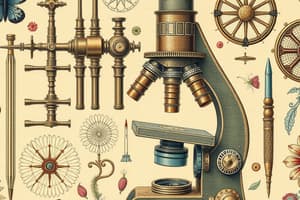Podcast
Questions and Answers
What is the primary purpose of the coarse adjustment knob on a microscope?
What is the primary purpose of the coarse adjustment knob on a microscope?
- To change the intensity of light
- To rotate the stage clips
- To sharpen the image after focusing
- To bring the specimen into general focus (correct)
Which part of the microscope is responsible for holding the slide in place during observation?
Which part of the microscope is responsible for holding the slide in place during observation?
- Coarse Adjustment Knob
- Illuminator
- Revolving Nosepiece
- Stage Clips (correct)
Which lens in a microscope is generally looked through and provides the standard magnification?
Which lens in a microscope is generally looked through and provides the standard magnification?
- Diaphragm
- Eyepiece (Ocular Lens) (correct)
- Objective Lens
- Draw Tube
What does the diaphragm (iris) in a microscope do?
What does the diaphragm (iris) in a microscope do?
What is the function of the fine adjustment knob on a microscope?
What is the function of the fine adjustment knob on a microscope?
Flashcards
Eyepiece (Ocular Lens)
Eyepiece (Ocular Lens)
The lens at the top of the microscope that you look through, used for magnification.
Objective Lens
Objective Lens
Lenses closest to the specimen, providing different levels of magnification.
Stage Clips
Stage Clips
Metal clips on the stage that hold the slide in place.
Coarse Adjustment Knob
Coarse Adjustment Knob
Signup and view all the flashcards
Fine Adjustment Knob
Fine Adjustment Knob
Signup and view all the flashcards
Study Notes
Microscope Parts and Functions
- Eyepiece (Ocular Lens): Magnifies the image, typically 10x or 15x.
- Arm: Connects the base to the head and eyepiece; used to carry the microscope.
- Stage Clips: Holds microscope slides in place.
- Coarse Adjustment Knob: Moves the stage for initial focusing.
- Fine Adjustment Knob: Refines focus after using the coarse adjustment.
- Draw Tube: Connects the eyepiece to the microscope body.
- Revolving Nosepiece: Holds and rotates objective lenses to change magnification.
- Objective Lenses: Varying magnifications (e.g., 4x, 10x, 40x, 100x). Positioned closest to the specimen.
- Stage: Flat platform to hold the slide for viewing.
- Diaphragm (Iris): Rotating disk with adjustable holes to control light intensity and cone size.
- Illuminator: Light source at the base of the microscope.
- Base: Provides support and stability for the microscope. Holds the illuminator and associated electrical components.
Studying That Suits You
Use AI to generate personalized quizzes and flashcards to suit your learning preferences.




